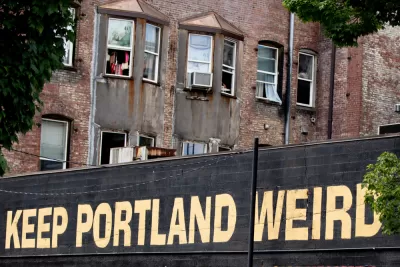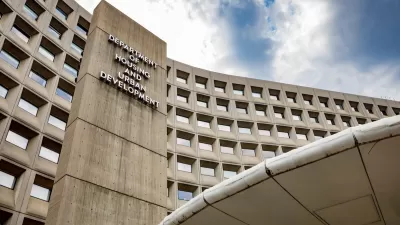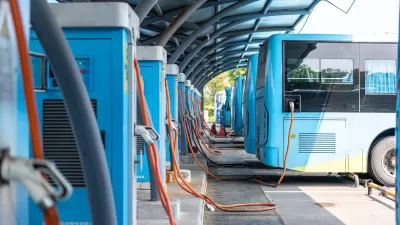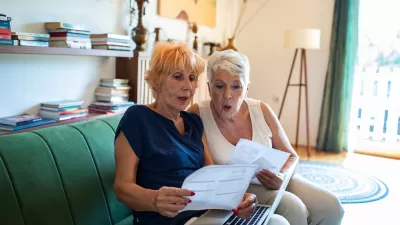A Portland coalition is drawing attention to the disproportionate impacts of unsafe and inefficient housing on low-income households and pushing for legislation that would mandate building improvements and tenant protections.

Sarah Sax reports in High Country News on the equity issues inherent in building safety, focusing on the city of Portland. "On average, Black, Latino and low-income families live in less energy-efficient homes and pay more for their energy, with low-income households spending the most, up to 38% of their income, according to the Oregon Energy Fund." In addition to the cost burden, access to heating and cooling can be a matter of life or death, as last year's deadly heat dome brought into stark focus. According to Sax, "At its core, safe, clean and affordable heating and cooling has become a justice issue."
Sax profiles the Build/Shift Collective, a community group made up of people of color and low-income renters in Portland.
Buildings are one of the largest sources of greenhouse gas emissions in the U.S., but the push to decarbonize them needs to involve more than just emissions, the activists believe. Decarbonization should also account for the unequal effects of climate change, racist housing policies and air pollution on communities of color, and it should strive to make sure everyone has access to a healthy home, not just an energy-efficient one.
The collective wants to ensure that residents don't lose housing in the effort to make buildings more safe and efficient. The group is working with the city to develop a set of rules called the Health, Equitable Energy, Anti-Displacement, Resilience, and Temperature control, or HEART, standards, which "would require landlords to insulate all units properly and have air conditioning installed" and "make sure that renters have the resources to push back whenever housing isn’t up to code, without fear of eviction."
The group is also seeking more representation for historically dismissed voices. "The collective wants more BIPOC representatives to help draft and make policy, but also to change where and how policy is made."
FULL STORY: Portland community leaders bring the heat to building standards

Planetizen Federal Action Tracker
A weekly monitor of how Trump’s orders and actions are impacting planners and planning in America.

Restaurant Patios Were a Pandemic Win — Why Were They so Hard to Keep?
Social distancing requirements and changes in travel patterns prompted cities to pilot new uses for street and sidewalk space. Then it got complicated.

Map: Where Senate Republicans Want to Sell Your Public Lands
For public land advocates, the Senate Republicans’ proposal to sell millions of acres of public land in the West is “the biggest fight of their careers.”

Maui's Vacation Rental Debate Turns Ugly
Verbal attacks, misinformation campaigns and fistfights plague a high-stakes debate to convert thousands of vacation rentals into long-term housing.

San Francisco Suspends Traffic Calming Amidst Record Deaths
Citing “a challenging fiscal landscape,” the city will cease the program on the heels of 42 traffic deaths, including 24 pedestrians.

California Homeless Arrests, Citations Spike After Ruling
An investigation reveals that anti-homeless actions increased up to 500% after Grants Pass v. Johnson — even in cities claiming no policy change.
Urban Design for Planners 1: Software Tools
This six-course series explores essential urban design concepts using open source software and equips planners with the tools they need to participate fully in the urban design process.
Planning for Universal Design
Learn the tools for implementing Universal Design in planning regulations.
Heyer Gruel & Associates PA
JM Goldson LLC
Custer County Colorado
City of Camden Redevelopment Agency
City of Astoria
Transportation Research & Education Center (TREC) at Portland State University
Camden Redevelopment Agency
City of Claremont
Municipality of Princeton (NJ)





























